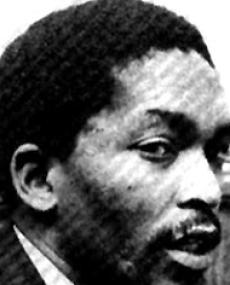
President of BPC, and Transvaal Vice – President of AZAPO
Kenneth Hlaku Rachidi was born on 11 April 1944 at Ga-Nchabeleng in Sekhukhuneland, Northern Transvaal (now Limpopo). He was the first born to Maria and Manabane Rachidi and had three other siblings. His parents were both school teachers in the area. He spent most of his early years staying with relatives in Limpopo and later attended several high schools, including Kilnerton. In 1965 he matriculated at Sekitla High School in Hammanskraal.
In 1966 Rachidi began a B.Com at the University of Fort Hare. University life offered Rachidi a newfound freedom to speak his mind without fear of parental reprimand. He was suspended in 1967 and re-admitted later that year, only to see himself expelled for leading a student sit-in. It eventually became impossible for him to finish his education.
Although Rachidi was politically orientated during his high school years, he never joined any organization. This changed at university with his active participation in the University Christian Movement (UCM) and theNational Union of South African Students (NUSAS). Dissatisfaction with both organisations saw him participating in the formation of the South African Students’ Organisation (SASO) inspired by the development of Black Consciousness in South Africa. In 1972 Rachidi also became active in the Black People’s Convention(BPC) established by SASO leaders. Rachidi served as a chairman of the Johannesburg Central branch of BPC, but in 1973 after the banning of the Secretary General and Vice Chairperson he became the national Vice Chair of BPC. Following pro–Frelimo rallies held throughout the country in 1974, and further arrests of BPC leaders, Rachidi saw himself playing the role of Secretary General of the organisation. At the BPC Congress held the following year, Rachidi was unanimously elected President, a position he held until the 1977 banning of the organisation.
On 27 June 1976, following the Soweto Uprising, Rachidi declared that the riots had ushered in a new era of political consciousness. His views attracted the repressive attention of the security branch of the South African Police and he was arrested in the first week of July, and detained, without charges at the Modderbee prison from October 1977 to October 1978. After his release he was restricted to the magisterial district of Johannesburg in terms of the Internal Security Act. Following the lapsing of these banning orders, he joined the Azanian People’s Organisation (AZAPO) and was elected Transvaal Vice-President at the party’s 1984 congress.
Rachidi is married to Mayttah and they have two sons and a daughter.